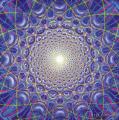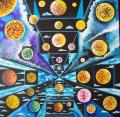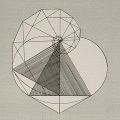
DMT-Nexus member
Posts: 1856 Joined: 07-Sep-2012 Last visit: 12-Jan-2022
|
Here is Robin Carhart-Harris and Chris Timmerman being interviewed recently.
|
|
|
|
|

DMT-Nexus member

Posts: 4733 Joined: 30-May-2008 Last visit: 13-Jan-2019 Location: inside moon caverns
|
Quote: I think this is a good thing, we need more rigorous no BS scientists researching these things. Looking at something from different angles has never hurt anyone, on the contrary. It is up to the individual on how to work results of these studies into his perspective. Life is diverse by definition and honoring that honors life itself. One of the reasons why people do not like these rigorous, reductionistic approaches is that they are associated with the opressors who keep psychedelics illegal. But that is just emotion in the end.
|
|
|

Don't Panic

Posts: 756 Joined: 28-Dec-2014 Last visit: 01-Oct-2022 Location: Everywhen
|
Reductionist approaches are bad, except for very simple and linear explanations. They fail to explain the oddities and outliers that appear to be outliers first, but are actually part of a much broader system. I think this study's hypothesis is testable, that entities trigger the same neurons as social contact with real people, but it does not explain the thematic similarities that most people experience. Deities and the like, especially originating from places that are exotic to the tripper. Not to mention the feeling of (or actually hearing) pearls of wisdom that one often takes home with them. This could be due to preconceived notions about psychs in general, hearing about these entities in other trips, and forming some sort of expectation, even though we should not expect anything. How on earth is something like that testable? Who knows if a 1% difference in air humidity makes all the difference? How can we control for variables when we don't even know all the variables at play? "A common mistake that people make when trying to design something completely foolproof is to underestimate the ingenuity of complete fools."
|
|
|

omnia sunt communia!

Posts: 6024 Joined: 29-Jul-2009 Last visit: 11-Jun-2025
|
Psilosopher? wrote:Reductionist approaches are bad... A bit of irony here, eh?  I think it's not so simple (nor dualistic), and ultimately, you have to start somewhere. As I said multiple times way back at the beginning of this thread, you have to start somewhere. That doesn't mean this research will present the final word, or even a coherent theoretical framework for future experiments, but it does present an approach for generating a chunk of data that can be processed and analyzed... even if the conclusions that can be drawn and extrapolated from it are incredibly limited. I'm curious what all the naysayers and shouters of "bias!" are proposing as an "alternative" (or perhaps they would claims "better"?) approach. What tools are you suggesting ought to be deployed? What approaches? What methodologies? It seems to me that every tool in humanity's proverbial toolbox, at the moment, is ill-equipped for resolving these questions (if they can even ever be resolved). That doesn't mean there's no merit to attempting to utilize those tools in the search for insights, even if we (and the researchers involved) are fully capable of acknowledging their shortcomings. Wiki • Attitude • FAQThe Nexian • Nexus Research • The OHTIn New York, we wrote the legal number on our arms in marker...To call a lawyer if we were arrested. In Istanbul, People wrote their blood types on their arms. I hear in Egypt, They just write Their names. גם זה יעבור
|
|
|

DMT-Nexus member
Posts: 181 Joined: 31-Mar-2013 Last visit: 09-Mar-2024 Location: A lucky place
|
Psilosopher? wrote:Reductionist approaches are bad, except for very simple and linear explanations. They fail to explain the oddities and outliers that appear to be outliers first, but are actually part of a much broader system.
I think this study's hypothesis is testable, that entities trigger the same neurons as social contact with real people, but it does not explain the thematic similarities that most people experience. Deities and the like, especially originating from places that are exotic to the tripper. Not to mention the feeling of (or actually hearing) pearls of wisdom that one often takes home with them. This could be due to preconceived notions about psychs in general, hearing about these entities in other trips, and forming some sort of expectation, even though we should not expect anything.
How on earth is something like that testable? Who knows if a 1% difference in air humidity makes all the difference? How can we control for variables when we don't even know all the variables at play? Take groups of people who have never seen (in real life) certain themes commonly reported by standard western psychonauts (such as the prototypical grey alien face, ancient egypt iconography, jesters, and so on) and give them DMT. For example uncontacted indigenous tribes who are completely removed from global civilization. Give them DMT in a controlled setting and see what kind of visions they report. If the type of visions they report are similar to those reported by standard western psychonauts, the results could give some credence to the idea that the entities are autonomous. If they never report ancient egypt iconography, circus-style jesters, prototypical grey alien faces etc, but only images related to their own limited cultural context and imagery, that could give more credence to the idea that the DMT experience is an hallucination similar to other hallucinatory phenomena. It wouldn't be definite "proof" of course, but definitely some evidence. You would have to make sure that you don't "induce" the participants' answers by simply showing them an image of a jester and making them say "yes, I saw something like that". You would have to use a proper methodology that tries to extract the core features of the images the participants see, and to make sure that the participants are not simply interpreting the same images in different ways. It would be difficult to conduct such an experiment, and there would be ethical concerns, but it's interesting to try to imagine what kind of results could come out, and their implications.
|
|
|

DMT-Nexus member

Posts: 3090 Joined: 09-Jul-2016 Last visit: 03-Feb-2024
|
Psilosopher? wrote:Reductionist approaches are bad, except for very simple and linear explanations. They fail to explain the oddities and outliers that appear to be outliers first, but are actually part of a much broader system.
Reductionism and holism are not mutually exclusive. Kurt Gödel and Werner Heisenberg used reductionism to show that reductionism has it's limitations, for instance.
|
|
|

DMT-Nexus member
Posts: 88 Joined: 23-May-2012 Last visit: 08-Jul-2019 Location: California
|
Robin Carhart-Harris and the team at London Imperial College have indeed been doing phenomenal research into the neuro-physiology that underlies the human psychedelic state, and I can only stand back and truly commend these efforts. Furthermore, I am not questioning their scientific habitus or the validity of the data that they have proffered on by way of fMRI, MEG, etc, research and the likes - in fact I find this kind of research into psychedelics long overdue, and it will doubtlessly serve to further elucidate how the brain functions, both psychedelically inebriated and sober. As an avid reader and proponent such research, I cannot stress enough that I am genuinely delighted to see this science proceeding. What I do question, however, is the interpretations that they sometimes bring to this neuro-imaging data. It seems clear to me that - like the majority of (but certainly not all) neuroscientists - Carhart-Harris et al are operating under assumptions that purely reflect a commitment to the default position of reductive physicalism, and they seem committed to this position a priori. For Carhart-Harris, it is a pre-theoretical truth the brain equals mind, and hence anything strange that enters mind during a psychedelically induced altered state must originate from elsewhere in the brain. This position is not argued for anywhere in their publications; rather it appears to be taken for granted from the get-go. I do see the necessity of taking such a conservative position in order to continue to secure research grants and foster one's reputation within academia. At the same time I also find it quite unfortunate that, with regards to the mere possibility of potentially expanding their ontology of mind and reality, the door is firmly shut for these researchers. Likewise, I must say I find it unfortunate that Carhart-Harris et al continually pathologize the psychedelic state in numerous talks and papers, regarding it as a debasement of ordinary waking-state consciousness and lacking any epistemic value whatsoever. I don’t have any intention of getting into here why I personally believe reductive physicalism to be inadequate when it comes to matters of mind and consciousness. Such an approach will ordinarily take one very far in science (so it certainly has great explanatory value), but I'd argue it's only a partial truth about reality. I think it’s of paramount importance that we keep in mind the relationships that exist between concepts of “correlation”, “causation”, and (reductive) “explanation”, and hence acknowledge the limits inherent in neuro-imaging data alone to mitigate between the “reality” or “unreality” of an experience. These issues are very much related to the infamous "explanatory gap" (Levine) and the "hard problem" of consciousness (Chalmers), rearing its head again. Here I’d like to provide a quote from cognitive scientist Edward Kelly, from the University of Virginia, writing about mystical experience and the neural correlates of consciousness: Quote:On the other hand, it should be equally clear that identification of some biological condition or conditions under which mystical experience occurs would not by itself disprove its objective significance. Reductionist scientists have always been inclined to overlook this rather elementary logical point, and the recent spate of facile and triumphant neurologizing about “God Spots” and the like is only the latest installment in a long and dismal history. William James went to considerable pains to disarm this unthinkingly skeptical attitude in the very first chapter of VRE: Medical materialism “has no physiological theory of the production of these its favorite states [i.e., ordinary states], by which it may accredit them; and its attempt to discredit the states which it dislikes, by vaguely associating them with nerves and liver, and connecting them with names connoting bodily affliction, is altogether illogical and inconsistent” (p. 30). All ordinary perceptual and cognitive experience goes forward in conjunction with biological processes in our bodies and brains, but nobody denies for that reason that such experience can teach us important things about the reality in which we find ourselves situated. It could also be the case, as the mystics themselves believe, that their experience contains lessons of at least equal importance in regard to that reality. As James himself concluded, mystical experience like all other experience “must be sifted and tested, and run the gauntlet of confrontation with the total context of experience” (VRE, p. 326). There is no reason for any party to the debate to deny that there are physiological correlates of these experiences, and that these correlates will be revealed by various neuro-imaging techniques. If experiences of something “outside” an individual’s neuropsychology do occur - that is, if the experience is in some sense veridical or at least epistemically valuable - then obviously some mechanism in us permits them to occur, and all the researchers have done is identify the neurological processes involved in such permission. The neuro-imaging data alone is completely neutral on the exact relationship between the brain processes and said experiences. (Philosopher David Chalmers goes into this subject in greater depth in a 1996 paper entitled, "On the Search for the Neural Correlates of Consciousness" ). That the brain generates these experiences is certainly one possibility. However, as I’m sure many of you know, this is not the only possible relationship that can be logically posited. Alternatively, the brain’s role might simply be one of mediation, that is, if the brain acts as a filter for aspects consciousness or certain psychological content. (Indeed, I know a fellow Nexian who happens to be a computational neuroscientist, and who has argued for a non-reductive view of the DMT-experience that's very much akin to the latter position articulated above...  I'd be interested to see what he has to say on this topic.) Like I said, I do not intend to argue further for one position over the other here (on this forum, such a discussion can go back and forth for a looong time! ). But I think it is a mistake to believe that, in simply measuring alterations of brain functioning in conjunction with any given experience, one is therefore justified in concluding that that experience is either "falsidical" or "identical" to the correlative brain state. Nevertheless, I'm very eager to see the results of this research when it's published. If anyone doesn't already know, there's a talk given by London Imperial's Chris Timmermann at Breaking Convention 2017 (on Youtube), in which he presents EEG data currently gathered on IV DMT-induced psychedelic states. I believe that this research is what was alluded to in the article referenced by the OP. Based on the data presented by Timmermann, the EEG signatures for the DMT induced state seem very much to resemble that of psilocybin.
|
|
|

DMT-Nexus member
Posts: 4031 Joined: 28-Jun-2012 Last visit: 05-Mar-2024
|
What came first, chick or egg? We don't easily buy into that anymore. But when it comes to 'experiences' and 'brain-activity' then still some of that stalemate re-surfaces. As if there remains a little of the competing stances that brain-activity induces experiences, or visa verse. Can we stop thinking in such terms and start seeing it as a whole, as the same things going hand-in-hand? If experiences would not be reflected in the body at all, be it brain maps, blood analysis, etc etc, then this would mean ... (fill in dots yourself) I don't see reason why such a reflection (obtaining measuring data and creating correlations) would be called 'reductionist', I'd rather call it expect-able to high degree. Someone has one reason to share why experiences would not reflect to measurable degree in any form? Please chime in, maybe I'm overlooking something very important. Calling experiences non-valid because we measure brain (or other simultaneously) activity, now that would be a reductionist point of view, self reduction of one's own intelligence mostly imho. Same for calling (well executed/interpreted) measured data correlations non-valid.  Personally I think of the body/brain as a sort of receiver, its constitution (brain maps etc etc indicating) as the form of the antenna, antenna form determines which "frequencies" are received and that determines the experience. Turn that story 180 degrees if you want, have a roll on that, still it makes for an ultimate bound between the two, and that is my debunk chick-egg, it gives me a comforting feeling. 
|
|
|

DMT-Nexus member
  
Posts: 3555 Joined: 13-Mar-2008 Last visit: 07-Jul-2024 Location: not here
|
JustATourist wrote:
A way to investigate how much the perception of faces is involved in the DMT experience and to what extent it predicts sensed presences of other components of the experience, would be to give people DMT and use Transcranial Magnetic Stimulation (TMS) to inhibit the "fusiform face area" or other related areas of the brain and see how much the DMT experience changes, compared to a control group. To see how many of the possible components of the DMT experience depend, or are related to the perception of faces.
Does this sort of TMS to region of the brain normally have an effect on perception of faces? Has that ever been tried on its own?
|
|
|

DMT-Nexus member

Posts: 4733 Joined: 30-May-2008 Last visit: 13-Jan-2019 Location: inside moon caverns
|
Quote:Take groups of people who have never seen (in real life) certain themes commonly reported by standard western psychonauts (such as the prototypical grey alien face, ancient egypt iconography, jesters, and so on) and give them DMT.
For example uncontacted indigenous tribes who are completely removed from global civilization.
Give them DMT in a controlled setting and see what kind of visions they report. Maybe relevant http://www.maps.org/news...tters/v13n1/v13n1_47.pdfBenny Shanon - Antipodes of the Mind A great book!
|
|
|

DMT-Nexus member
Posts: 88 Joined: 23-May-2012 Last visit: 08-Jul-2019 Location: California
|
Couple of questions above that I may be able to shed some light on. There have indeed been studies that have electrically stimulated the fusiform face area and other related brain regions in patient populations. I'll attach two relatively recent papers - one that involves direct electrical stimulation of the fusiform face and related areas with implanted electrodes, and another relevant paper by that involved stimulation of the parahippocampal place area and the temporal lobe. Both kinds of stimulations invoked rather mundane visual phenomena, with subjects seeing faces and scenes very obviously derived from personal memories. For example, in the fusiform study, the subject reported seeing the doctor's face "morph" into the face of that of a different person, who apparently "looked familiar". In the second study that stimulated the parahippocampal place area, the subject reported "dream-like" imagery and seeing scenes from her neighborhood (houses, etc), as well as familiar (human) faces. (I personally see a strong dissimilarity in these kinds of studies and the phenomenology of psychedelics, with any possible overlaps being rather superficial. But you're free to judge for your self.) EDIT: Forgot to attach a paper that reviewed the effects of applying transcranial magnetic stimulation to the fusiform face area. It was noted that TMS application to fusiform area interfered with patients' ability to discern emotional content of faces and to discriminate faces from objects, but that these effects were dependent on a larger network of cortical regions [Atkinson, A. P. and Adolphs, R. (2011). The neuropsychology of face perception: beyond simple dissociations and functional selectivity. Philosophical Transactions of the Royal Society]. Regarding reports of naive subjects and their experiences with psychedelics: This can be a complicated and tricky question, but there's some avenues that have been explored already. It definitely would be illuminating to see more research of the kind described below, however. Quote:
Take groups of people who have never seen (in real life) certain themes commonly reported by standard western psychonauts (such as the prototypical grey alien face, ancient egypt iconography, jesters, and so on) and give them DMT.
For example uncontacted indigenous tribes who are completely removed from global civilization.
Give them DMT in a controlled setting and see what kind of visions they report.
- Beginning in the late 1960's, Claudio Naranjo studied the effects of harmaline (ayahuasca brew component) in ostensibly naive subjects who were born/raised in urban environments, an who were supposedly unaware of the lore associated with Amazonian shamanism. A few papers were published on this research: Among other things, the so-called "urban elite" subjects did report seeing visions of snakes and jaguars, as well as various imagery germane to the ayahuasca literature. - As Obliguhl stated above, Benny Shanon's "Antipodes of the Mind" is a cognitive-psychological investigation into this very question, i.e. that of highly specific cross-personal semantic similarities in the imagery of subjects participating in ayahuasca ceremonies. (Shanon himself claims to have been naive to the subjective properties of ayahuasca the first few times he imbibed, and in "Antipodes" he collects and analyzes the reports of numerous other individuals, many of whom were also similarly naive). "Antipodes of the Mind" is a truly extraordinary piece of investigative work on the phenomenological properties of ayahuasca - really second to none thus far - and I couldn't recommend this book more. - In an essay by researchers David Luke and Andrew Gallimore that was included in "Neurotransmissions" (collection of essays derived from the Breaking Convention conferences), the authors reviewed a 1950s study by Hungarian physician and chemist Stephan Szara, in which Szara administered DMT to schizophrenic patients in an attempt to explore a 5-HT2A model of psychosis. The paper by Luke and Gallimore compares the reports of these 1950s patients with more contemporary reports. While the reports of Szara's patients are rather sparse, there are some striking similarities that can be noted. - Rick Strassman states in "DMT: The Spirit Molecule" that he was wary of a potential "McKenna effect" - that is, that Terence McKenna's rap about DMT entities could have subconsciously influenced the trip of his subjects. Strassman states (in note 1 of chapter 21) that he queried his subjects on whether or not they were familiar with Terence McKenna's now infamous spiel (or, for that matter, if they were previously aware of any reports of encounters with entities characteristic of the DMT-trance). "Few if any were," he states therein, and concluded that the "McKenna effect" couldn't account for the majority of his subjects' reports. There's a number of other reports scattered in the published literature of (in my opinion) credible researchers who claim to have been naive at the time that they imbibed various psychedelic substances, but I'll leave it at that for now unless anyone asks. (I know, for example, both David Luke and Andrew Gallimore have published separate papers on this issue). I'll attach the paper by Luke and Gallimore, as well as a paper by Shanon that briefly gives an overview of "Antipodes of the Mind". Also below are citations for the aforementioned Naranjo studies. Naranjo, C. (1967). Psychotropic properties of the harmala alkaloids. In D. Efron (Ed.), Ethnopharmacologic Search for Psychoactive Drugs: Proceedings of Symposium held in San Francisco, January 28-30, 1967 (pp. 385-391). Public Health Service Publication No 1645. Washington, DC: US Department of Health, Education, and Welfare. Naranjo, C. (1973). The healing journey: New approaches to consciousness. New York: Ballantine Books. Naranjo, C. (1987). “Ayahuasca” imagery and the therapeutic property of the harmala alkaloids. Journal of Mental Imagery, 11 (2), 131-136.
|
|
|

Boundary condition

Posts: 8617 Joined: 30-Aug-2008 Last visit: 24-Dec-2025 Location: square root of minus one
|
zapped17 wrote:I find it unfortunate that Carhart-Harris et al continually pathologize the psychedelic state in numerous talks and papers, regarding it as a debasement of ordinary waking-state consciousness and lacking any epistemic value whatsoever. Can you point to particular instances where this has explicitly happened? Given the prestigious institution for which they work, I get the feeling that they are somewhat obliged to present this kind of a front otherwise they would soon find themselves short of funding. Given that RC-H is a mere 37, I would also suggest his views might become a bit more outspoken once he approaches retirement age. (Just think where we could be in fifty years  ) “There is a way of manipulating matter and energy so as to produce what modern scientists call 'a field of force'. The field acts on the observer and puts him in a privileged position vis-à-vis the universe. From this position he has access to the realities which are ordinarily hidden from us by time and space, matter and energy. This is what we call the Great Work." ― Jacques Bergier, quoting Fulcanelli
|
|
|
DMT-Nexus member
Posts: 273 Joined: 21-Jan-2016 Last visit: 03-Nov-2017
|
SnozzleBerry wrote:Psilosopher? wrote:Reductionist approaches are bad... A bit of irony here, eh?  I think it's not so simple (nor dualistic), and ultimately, you have to start somewhere. As I said multiple times way back at the beginning of this thread, you have to start somewhere. That doesn't mean this research will present the final word, or even a coherent theoretical framework for future experiments, but it does present an approach for generating a chunk of data that can be processed and analyzed... even if the conclusions that can be drawn and extrapolated from it are incredibly limited. I'm curious what all the naysayers and shouters of "bias!" are proposing as an "alternative" (or perhaps they would claims "better"?) approach. What tools are you suggesting ought to be deployed? What approaches? What methodologies? It seems to me that every tool in humanity's proverbial toolbox, at the moment, is ill-equipped for resolving these questions (if they can even ever be resolved). That doesn't mean there's no merit to attempting to utilize those tools in the search for insights, even if we (and the researchers involved) are fully capable of acknowledging their shortcomings. Good point. We are merely doing our best. The problem is not when science tries to ask questions but when peoples particular interpretations of the data are mistaken as Science (with a capital 's' ). Truth is, as someone who loves science myself, that science doesn't often touch on Truth (with a capital 't' ). It merely gives us minor truths (data) which we must interpret within some sort of mental framework in order to understand their relevance. At the same time I empathize with those on here who are bothered by the reductive approach because while science is a pure art, Science has become the modern day dominant religion. Science so often becomes a tool for cultural validation. "Alternative medicine hasn't been appropriately studied therefore it doesn't work". Likewise I can easily see this being used to undermine the value of psychedelics as reductionism tends to do. "We've converted our perception of reality into a formalism and somehow that strikes it of all it's magic". Not because the data itself calls for this, but because this is the culture of science in the west. These authors have a real opportunity here so hopefully they don't screw it up. We all know the benefits of DMT here. Understanding how it works should not remove the significance, but give it new significance.
|
|
|

DMT-Nexus member
Posts: 71 Joined: 02-Sep-2017 Last visit: 09-Nov-2020 Location: Brisbane Australia
|
I am interested to learn, by reading the scientific report that will result from the study, about what kind of DMT experiences might be possible to experience whilst trapped into the setting of the interior of an fMRI machine with an EEG cap on one's head, and within the mindset of being the subject of the experiments of western science. What kinds of entities might well inhabit the mental space, could prove worthy knowledge perhaps. (She writes thinking of witnessing her father's PhD research in the early 1970s with one of the original NMR machines and how his PhD laid the foundations of all MRI technology which developed out of Harvard scientists taking his research further, ...Thank God Mum said no we won't be moving to America, and Dad declined the invitation to assist any further.) And now machines within machines within the machinery of the biosphere have come to mind, as the microbiome in me thinks better of letting myself get into an MRI machine again. I think machinery confusions could need to be avoided somehow without deriding the scientific efforts of those whose experiential reality preferred the more stable of solid matter forms. a mother a daughter a lover of life, an exorcist of addictions if ere in need of the strife, and at bottom line a wife, I might well be a bore, yet have no doubt, I stand among the poor, and beg not what for, that hat hath at, nobody's mind fell too flat
|
|
|

DMT-Nexus member
Posts: 71 Joined: 02-Sep-2017 Last visit: 09-Nov-2020 Location: Brisbane Australia
|
zapped17 wrote:Regarding reports of naive subjects and their experiences with psychedelics: This can be a complicated and tricky question, but there's some avenues that have been explored already. It definitely would be illuminating to see more research of the kind described below, however.
Thanks for that run down of what's been done. The obvious point might be, that a "McKenna effect" happens to even be considered, suggests that McKenna himself had some of his metaphors about the technology interacting with the formation of culture, potentially askew. If his every metaphor worked to substantiate how cultures are formed, then everybody would just accept all of, without question, that being the nature of how cultures come into being. So what we are finding, is that each and every time there is the merest suggestion of a challenge to McKenna's model of how reality is perceived through psychedelics, his contribution becomes a bit less of the total volume of what comprises how The West contributes. And all the more we may need consider further what survives that is unaligned with The West. For example, my own experiences are just as likely to take the form of the Monkey mythology of China, as any other, but Monkey in particular as my childhood years saw much of on television, and I also found in China, the English language version of the full set of beautifully illustrated pictures books, purchased for my son I happened to be pregnant with at the time. Familiarity is indeed something of the master of contempt. a mother a daughter a lover of life, an exorcist of addictions if ere in need of the strife, and at bottom line a wife, I might well be a bore, yet have no doubt, I stand among the poor, and beg not what for, that hat hath at, nobody's mind fell too flat
|
|
|

DMT-Nexus member
Posts: 26 Joined: 03-Feb-2017 Last visit: 15-Nov-2017
|
The subject moved away from biases in general, but I'd still like to drop my 2 cents: The discussion pointed out that both the readers and the doctor might be biased, but only touched the subject that the reporter himself is highly biased. And this one has an agenda. The forementioned clickbait. Does the regular pot or shroomhead get what this doctor is talking about? No. So we have to make him understand. If it's about DMT it's probably a good idea to allude to McKenna's meme of machine elves. Would the article look the same if it was an interview led by a journalist for Nature magazine? Probably not. So we have an additional perception filter with an agenda. That being said, I highly appreciate the fact that the doctor continues where Terence has stopped. Terence always said that his motivation was to disprove or dismantle spirituality. Then he found it and propagated it and the way that led to it. So the doctor continues what Terence did, not what he said. That's a good thing. The Nort Pole has been discovered as well as the Himalaya. Does that mean people don't go there anymore? Does that mean there is no value in going there anymore? Only if you think life is a race and the sole purpose is to arrive somewhere first. But for the explorer the hardship is still there. I believe it changes a person profoundly to interact with an environment that is hostile towards his body, but without any agenda of beig hostile. Terence created the meme "machine elves." And he said how happy they were that he interacted with them. I always wondered if he was familiar with the idea of memes, because the image of machine elves itself appears to me like a visual hallucination (this word is not meant to be derogatory) of the concept of memes. He put out some. He changed others. Maybe his first DMT experience set him on the right track of talking about psychedelics. He did that very well. It's an intrinsical attribute of memes to be malleable and they come in very different forms of language: audible, visual, haptic, 3D... ...but it all looked so real! It's not just imagination! Here is why.
|
|
|

❤️🔥
 
Posts: 3648 Joined: 11-Mar-2017 Last visit: 12-Feb-2026 Location: 🌎
|
werver wrote:
...
Terence created the meme "machine elves." And he said how happy they were that he interacted with them. I always wondered if he was familiar with the idea of memes, because the image of machine elves itself appears to me like a visual hallucination (this word is not meant to be derogatory) of the concept of memes. He put out some. He changed others. Maybe his first DMT experience set him on the right track of talking about psychedelics. He did that very well. It's an intrinsical attribute of memes to be malleable and they come in very different forms of language: audible, visual, haptic, 3D...
Yes, he was aware of memes and would lecture about them as the fundamental unit of language, equating living memes in language to living genes in DNA, both needing to replicate/survive if I remember my psychedelic salon podcasts right. Listen to this sound bite for example. Cheers.
|
|
|

DMT-Nexus member
Posts: 71 Joined: 02-Sep-2017 Last visit: 09-Nov-2020 Location: Brisbane Australia
|
zapped17 wrote:It seems clear to me that - like the majority of (but certainly not all) neuroscientists - Carhart-Harris et al are operating under assumptions that purely reflect a commitment to the default position of reductive physicalism, and they seem committed to this position a priori. For Carhart-Harris, it is a pre-theoretical truth the brain equals mind, and hence anything strange that enters mind during a psychedelically induced altered state must originate from elsewhere in the brain. This position is not argued for anywhere in their publications; rather it appears to be taken for granted from the get-go. I do see the necessity of taking such a conservative position in order to continue to secure research grants and foster one's reputation within academia. There is an idea in Hindu philosophy and Ayurvedic medicine, perhaps likely also Tibetean, (and I encountered via a specific form of application of Eastern thought systems to homeopathy), that each region of the body, needs rely upon the ATP produced in the cells of that region, whereas if any region borrows ATP produced in another region, the resulting ADP, is like a slug causing blockages, and can't readily be reprogrammed to be returned into ATP in the new region. In fact the whole theory is about energy being stolen by different regions from where the energy is produced, being the essence of all diseases and disease susceptibilities/vulnerabilites. Now reading the quote above, I had the bizarre thought, of what if negative "cha" charged entities, were related with energy stealing between neurone networks, . . . . . . but then I got taught homeopathy by a man who offered me a joint alongside his homeopathy prescription, and explained homeopathy as each remedy being the bigger negative entity than the disease causing negative entity, but a knowable and externally sourced negative entity, that is perfectly well behaved, and only hangs around long enough to gobble up the disease entity. a mother a daughter a lover of life, an exorcist of addictions if ere in need of the strife, and at bottom line a wife, I might well be a bore, yet have no doubt, I stand among the poor, and beg not what for, that hat hath at, nobody's mind fell too flat
|
|
|

DMT-Nexus member
Posts: 19 Joined: 15-Oct-2017 Last visit: 12-Jul-2018
|
What if the bias expressed is just a tool to help him with the permits you would need to obtain for such a study and he is actually interested if they are "real" or not. If he acts like he's trying to disprove something, I would think that might make his approval odds higher with most people against the substance itself. I didn't look into the study or where it's taking place for that matter, it's just a thought. Before enlightenment chop wood and carry water, after enlightenment chop wood and carry water.
|
|
|

I rather root my values in my own hallucinations than in society´s neurotic illusions..
Posts: 681 Joined: 08-Jul-2017 Last visit: 08-Jul-2020 Location: Barcelona
|
CraniumCandy wrote:What if the bias expressed is just a tool to help him with the permits you would need to obtain for such a study and he is actually interested if they are "real" or not. If he acts like he's trying to disprove something, I would think that might make his approval odds higher with most people against the substance itself. I didn't look into the study or where it's taking place for that matter, it's just a thought. This make some sense. It is probably of some use that he have this attitude. It can also be to make headlines. And I agree with said above somewhere that it can be a good attitude to have for correct and critical analysis and in similar MCkenna approach. Maybe he have strong academic research pride that overpower the bias  Anyone know how it went with this study/experiment? "Too cute to live, too cozy to die" - Eaglepath
|